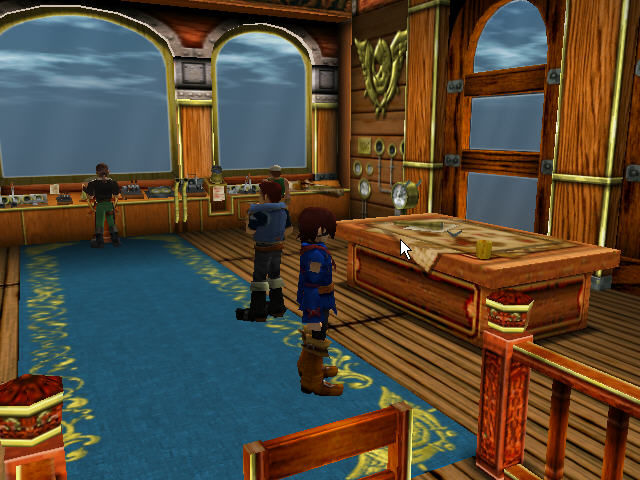
I think every other review of Skies of Arcadia has summarized the Dreamcast’s lack of quality RPGs prior to the release of this game. I’m assuming you know that already. What you’re really interested in reading about is whether or not the game is worthy of all the praise it’s received in other reviews, right? In a word, the answer is “yes.” Now, let me tell you why.
Skies of Arcadia tells the story of Vyse, the son of the leader of a band of Air Pirates called Blue Rogues. Vyse longs to own his own ship and sail around the skies, fighting injustice wherever it may occur. When his father’s crew boards an enemy airship and rescues Fina, a beautiful girl from another land, a chain of events is inadvertently set into motion that may lead to the destruction of the entire world. It’s up to Vyse and his friend, Aika, to save the world and make everything right.
OK, so the plot doesn’t sound particularly new or innovative and my summary doesn’t do it much justice, but that’s the basic outline. The beauty of the game is how the story plays out and how the individual pieces are put together. Excellent graphics, wonderful characters and a great musical soundtrack are all icing on the cake. Face it, if you’re going to invest a lot of time into playing an RPG, you’d rather not suffer through a game with boring characters and uninteresting quests. Skies of Arcadia certainly does not suffer from this problem. The characters are, in a word, delightful and that’s an adjective I’d be hard-pressed to use regarding any other RPG character that’s come down the pike in the last year or two. No self-absorbed loners in this bunch.
Skies of Arcadia features two types of combat. There’s the usual “party vs. opponents” combat and there’s also a “ship vs. ship” combat mode. The first type is turn-based, while the ship combat is more strategic, requiring you to plan four moves ahead at each turn. The standard party combat is unique in that each character in your party has the ability to cast magic, so there’s no set role for each member. (There’s no reason Vyse can’t heal the party just as often as Fina, in other words.) Although each character’s abilities may lean towards his/her use in a particular role, you’re not restricted to do so. The party also has what are called “spirit points,” which are shared by the entire party. Use of magic spells and “super moves,” which range from strong offensive attacks to defensive magic or reviving a dead party member, requires the use of these spirit points. At the beginning of each turn, a small amount of spirit points is added to the party’s total amount. If unused, they accumulate throughout the battle, allowing for stronger moves and magic to be used. Party members can also “focus” to generate additional spirit points.
Spirit points are also used in the ship-to-ship battles as well. However, the combat unfolds in four move sections. At the beginning of each turn, the player is presented with a grid that allows you to plot four moves in advance. You choose what each party member will do and when but, after finalizing your moves, you simply watch them play out. The trick is to try and predict what your opponent will do and try to counteract it or take advantage of it. In later battles, your ship will usually be equipped with a “super weapon” that requires a large amount of spirit points to fire. Some players may find the strategic aspects secondary to simply trying to generate the spirit points needed to fire the big gun. Still, the ship battles are big part of the game’s overall charm.
One thing that’s really enjoyable about Skies of Arcadia is the amount of detail put into each area you visit. From lush rain forests to desert sands, each area, as well as its accompanying dungeons, are filled with small, but significant details. The design of each area is logical and, if you pay attention to the aforementioned details, you’ll discover secrets hidden in each one. I never found myself getting lost or frustrated trying to navigate through a dungeon. Some of the dungeons contain some fairly difficult puzzles, but there’s nothing that will cause you to rack your brain too severely.
Before I make it sound like there’s nothing wrong with Skies of Arcadia, let me point out the only major flaw in the game. There are simply too many random battles. They become excruciatingly annoying in the middle section of the game, when navigating through the world map is crucial to advancing the plot. You will find your concentration broken by random battles nearly every 15 to 30 seconds while piloting your ship. While this does help your characters level up, it also detracts from the game’s atmosphere. Once you get your bearings after one random battle and begin to make some progress towards your intended destination, you’ll find yourself in yet another random battle. Very aggravating. Still, it does not ruin the game. It just stands out as a very bothersome problem in an otherwise flawless game.
Skies of Arcadia is a game that I really didn’t want to end. Although my play through lasted about 50 hours, I had a bittersweet feeling as I fought the final boss battle. I’d miss the game’s characters and the story-line. If that’s not an indication of a top-quality RPG, I don’t know what would be. So, if you’re a Dreamcast owner and you like RPGs, there’s absolutely no reason you shouldn’t get this game as soon as possible. Although there aren’t many top-shelf RPGs for the Dreamcast (and, with Sega pulling out of the hardware market, there probably won’t be many more), this game is quite possibly worth buying a Dreamcast to play. It’s that good.
9.5 out of 10.

